17 Best Substitutes for Fontina Cheese
When you buy through our links, The Breslin may earn an affiliate commission. Learn more
Fontina cheese substitutes are easy to find as there are many alternatives for you to pick. So do not fret when you open your cabinet and realize there is no Fontina left.
I know it might be hard to find this Italian cheese in your area sometimes, or its price is not budget-friendly to you, or even, because you are lactose intolerant.
Therefore, most of the substitutions I am about to present here are well-known cheeses and ingredients around the world so that you can find them quickly and at affordable prices. Wait no more, let’s jump into this post now.
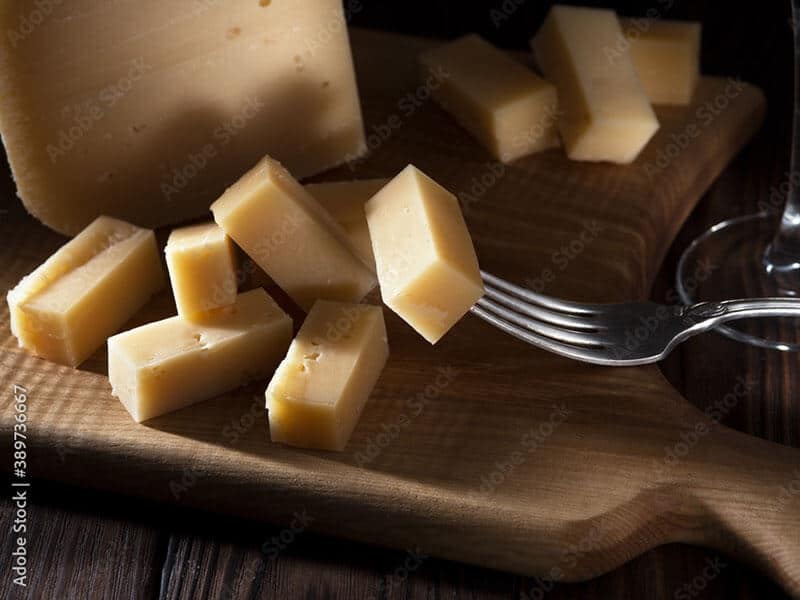
Fontina Cheese – A Phenomenal Dairy Product From Italy
If you have not tried Fontina cheese before, it is totally fine. Because by reading the following parts, you can briefly understand how they taste and their other characteristics. Here is the general information about this kind of cheese.
The Overview Of Fontina Cheese Profile
Fontina cheese (known as fontina, fontal, fontella, or fontinella) was invented in Northern Italy in the 12th century. The main ingredient to make this cheese is fat cow milk. Fontina has a pale cream color, semi-soft to semi-hard texture, and some small holes inside (1).
People usually shape the cheese into a wheel-form with 13 to 15 inches in diameter and 3 to 4 inches thick, then cut into smaller triangle pieces before selling.
Fontina cheese’s flavor is earthy, nutty, tangy, and buttery in general. However, compared to other Fontina varieties, the Italian fontina cheese is richer and pungent in taste.
Nowadays, you can easily find Fontina cheese in several countries like Sweden, Denmark, France, or the United States. But these versions are milder in flavor, softer in texture, and have more holes than the authentic Italian ones.
Fontina goes perfectly with many recipes, like pasta, pizza, sauces, dips, or sandwiches, especially hot dishes, as they are easy to melt.
With a softer texture, you can use this cheese to make fondue as well. Or you can serve them at room temperature with other fresh food, like salads or fruits.
If you want to make Fontina cheese at home, you should not miss this instruction.
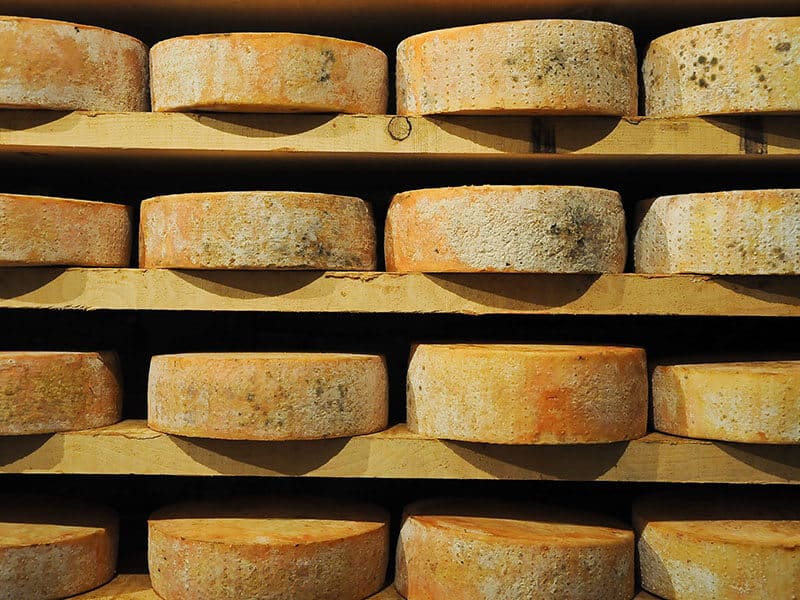
Advantages Of Fontina Cheese To Human Health
Fontina cheese contains various nutrients; therefore, if they are consumed at an appropriate level, this cheese will help you:
- Improve Heart Health and Prevent Cancer: Fontina cheese is rich in vitamin B and K, which will protect your heart or other organs from any disease. With 2 compounds like linoleic acid and sphingolipid, it will lower the risk of cancer.
- Boost Your Bone Function: High level of calcium (more than 6 times compared to milk) found in Fontina cheese will protect you from osteoporosis. With vitamin D, phosphorus, and folic acid, your bone can be strengthened as well.
- Support Your Immunity and Digestion: Antioxidant and selenium are 2 main properties that will help your immune work better. Plus, Fontina can be a good treatment for any disease related to your gut, like diarrhea, flatulence, or constipation.
- Regulate The Metabolic and High Blood Pressure: Calcium, phosphorus, and other beneficial bacteria in this cheese can manage metabolism and balance your blood pressure.
The Ideal Possibilities For Fontina Cheese Substitute
As Fontina cheese has various varieties with different characteristics, their substitutions are varied as well. These replacements can be soft or hard, but they all have some similar hints as an authentic version. So let’s find out what 17 solutions are.
1. Gruyere
This is one of the best Fontina cheese substitutions – Gruyere cheese. Gruyere is a famous Switzerland cheese that you can find in any market.
As Gruyere is also made from cow milk, this cheese has a close flavor profile as mature Fontina, which is creamy, nutty, and buttery. They also have a comparable hard texture.
However, this replacement works better with young Gruyere as aged Gruyere (more than 1 year) will develop their salty and sweet flavor, making their taste stronger.
Gruyere is ideal for toppings in hot dishes, like soups, pasta, macaroni, sandwiches, or casseroles. They can melt to make sauces, but Gruyere is not a good choice for a fondue dish. So if you are looking for the substitution of non-melted Fontina, stick with the Gruyere type.
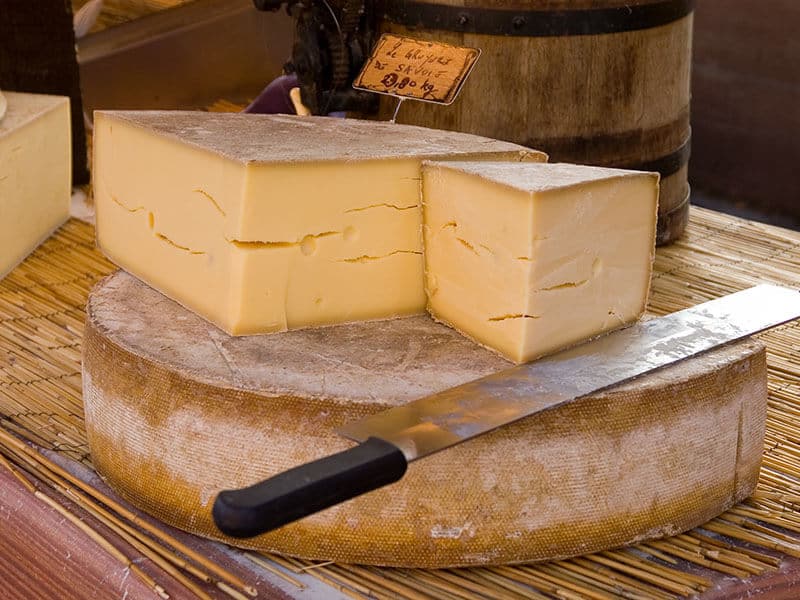
2. Emmental
The second alternative option is another cheese from Switzerland named Emmental, or you can call them Swiss cheese. They are semi-hard cheeses made from unpasteurized cow milk.
This cheese comes in with a very pungent smell. So this replacement might not be too ideal for those who are afraid of strong odor cheese.
Emmental cheese’s flavor is described as nutty, sour, and somewhat fruity. Though the smell is overwhelming, this cheese is pretty easy to eat.
They can be a good swap for Fontina to serve in various dishes like grilled sandwiches, veggies (as grated form), soups, sauces, fruits, and fondue as their melting point is low.
Fun fact: Emmental cheese has big holes inside. If these holes are larger, it means your cheese has stronger tastes.
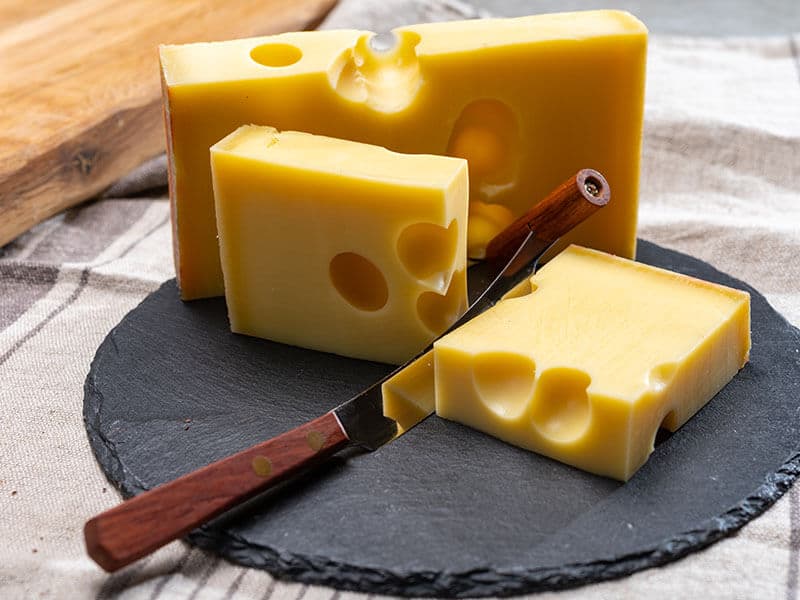
3. Havarti
This Danish cheese comes in a soft to semi-soft texture with a rich and creamy flavor that will make you forget the absence of fontina cheese.
They are also made from cow milk. But for the best swapping, you should only use Havarti cheese to exchange for young Fontina. And compared to the number of holes inside the cheese, you will see this type has more holes than Fontina.
Thanks to their soft texture, you can enjoy melted Havarti cheese in hot dishes, like pasta, macaroni, or grilled sandwiches.
Or if you want to enjoy them cold, you can either serve it at room temperature with salsa, fruit, and some wine or smash and mix them with herbs, seasonings to make a tasty condiment.
Want to learn more about Havarti? Here is what you should know.

4. Gouda
Like all the above substitutes, Gouda cheese (from the Netherlands) is also from cow milk. However, compared to Fontina cheese, the texture and color of this cheese are quite different as it can be semi-hard to hard with light ivory color.
The overall flavor of Gouda is very mild to mild. But this cheese is saltier than Fontina. Moreover, Gouda’s flavor also depends on the age of the cheese.
For example, young Gouda has a light nutty taste that can resemble Fontina cheese, while mature Gouda (about 2-year-old) is more fruity and sweeter.
To substitute Fontina, you can eat Gouda in any form, like cubed, sliced, tossed, or grated, in various dishes. For example, sandwiches, pasta, pizza, macaroni, salad, macaroni, veggies, or fondue.
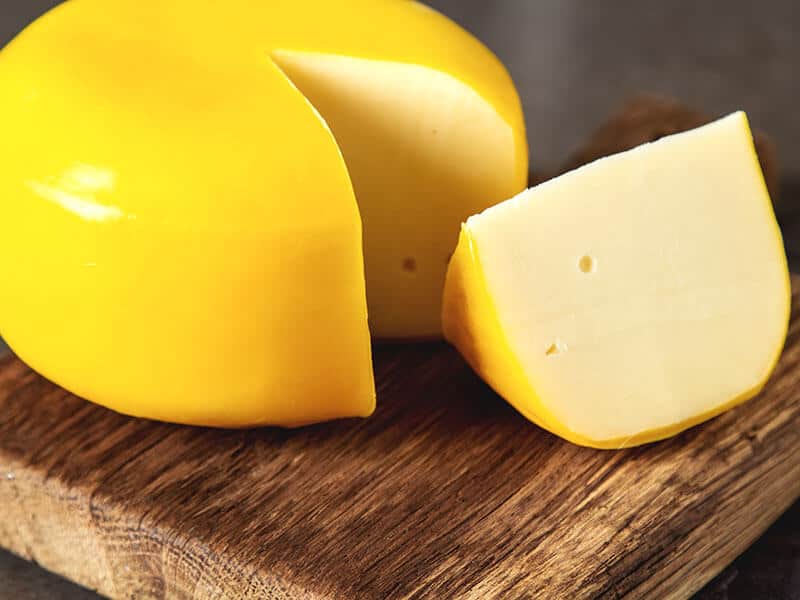
5. Provolone
Provolone cheese originated in Italy. As their popularity is huge, you can spot it at any market or store. Their age is younger than other cheeses, around 5 to 8 months, making them famous for their mild flavor. Besides, they also have a touch of tangy taste.
Provolone’s taste is milder than Fotina’s, but you can still use them as a suitable replacement in dishes where the recipes call for melted cheese, for example, sandwiches and sauces.
Though Provolone is a semi-hard cheese, it can be softer, so if you want to grate and sprinkle them on your pasta, pizza, or salad, you should cut them into slices and chop the cheese afterward. Or using a food processor to do it is also acceptable.
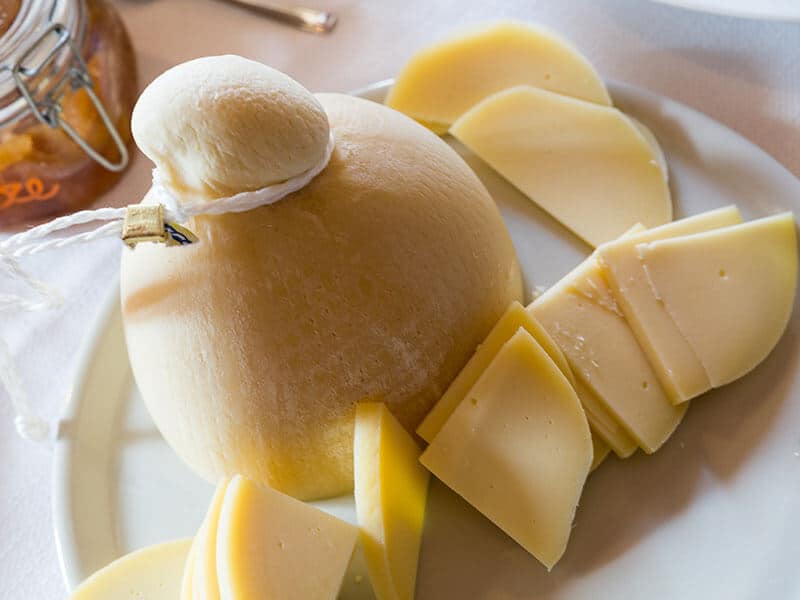
6. Taleggio
Taleggio – an Italian semi-soft cheese is another good deal for the Fontina alternative. A thin and coarse layer covers this cheese with a white to straw yellow color.
Taleggio has a tangy flavor, pungent smell, and even similar fat content as Fontina’s, which are 25 grams (2) and 31 grams (3)., respectively, making Taleggio cheese melt well Fontina
Besides, you can use Taleggio cheese instead of Fontina in salads, pizza, pasta, soups, sandwiches, meat-based recipes, or basically, any hot dishes. Serving them alone is also an excellent way to enjoy their taste if you love this cheese so much.
But you need to note that Taleggio can be soft like young Fontina; their flavor is as strong as matured Fontina. This cheese combines 2 characteristics in flavor and texture of both young and aged Fontina; that’s why you can use them to substitute.
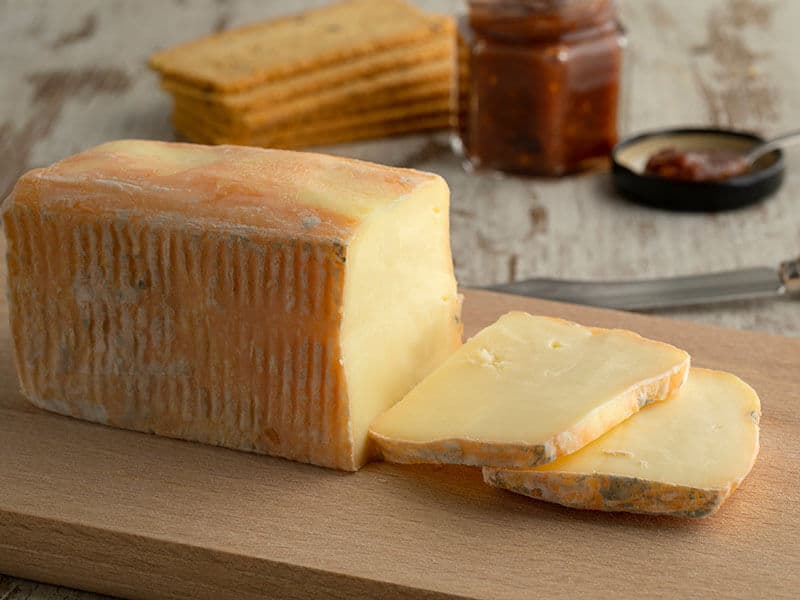
7. Vacherin
Made from pasteurized cow milk, Vacherin is another Swiss alternative. Thanks to their mild, buttery, and creamy flavor, you can use Vacherin to replace young Fontina, particularly the French Vacherin type (or called Mont d’Or).
Compared to Fontina, this cheese is softer. You can use them in various hot dishes as a melted cheese form. Just replace it in your fondue, sauces, pasta, desserts, from sweet to savory ones.
But there is one thing that you should remember is their melt form might turn into a fluid form easily. Or if desired, you can consume cold Vacherin cheese with crackers.
In general, if you love the richness of the cheese, Vacherin is a perfect ingredient because of its fatty and aromatic.
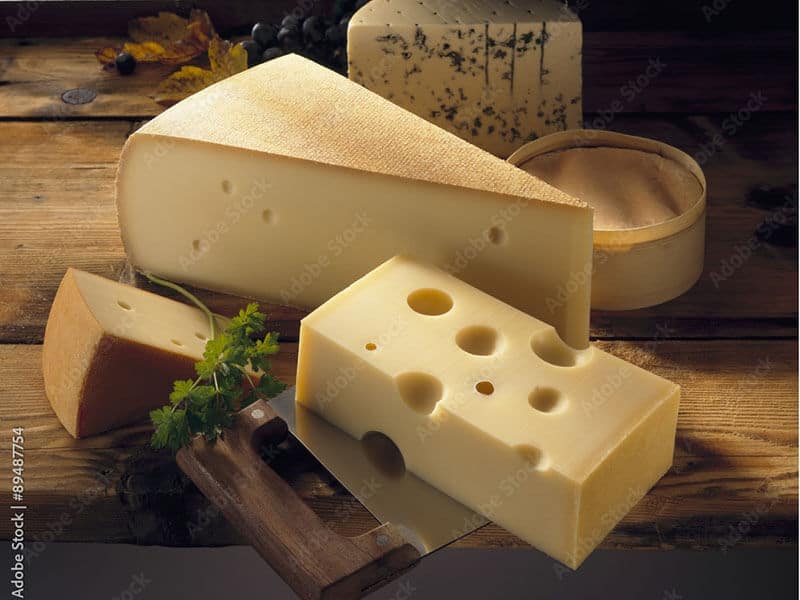
8. Edam
This Netherland cheese can be seen as a low-fat alternative for Fontina. In case you are trying to get fit, this cheese might be your new favorite.
Edam is a semi-hard cheese with pale yellow color. They have a similar creamy texture and milder flavor as Fontina; this replacement is amazing for bread, sauces, veggies, and meaty recipes.
Melted Edam can make your pasta or sandwiches more delicious. And another good thing about this cheese is its long shelf life. When they age, they might be tougher but will not be spoiled.
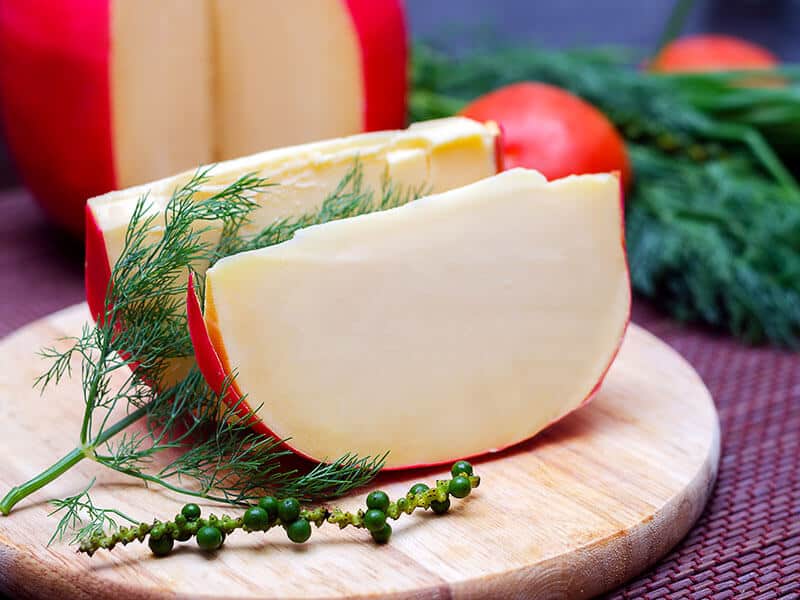
9. Grana Padano
If you are looking for an affordable cheese to substitute Fontina, Grana Padano will make your pocket smile as there are numerous producers for this kind of cheese.
Grana Padano is a hard cheese made from cow milk. They have a pale yellow color and a few tiny holes inside. With their mild and nutty flavor, you can use them to replace Fontina in pizza, pasta, soup, veggie dishes, etc., like grated cheese.
Also, since Grana Padano has a hard texture, they can be easily crumbled.
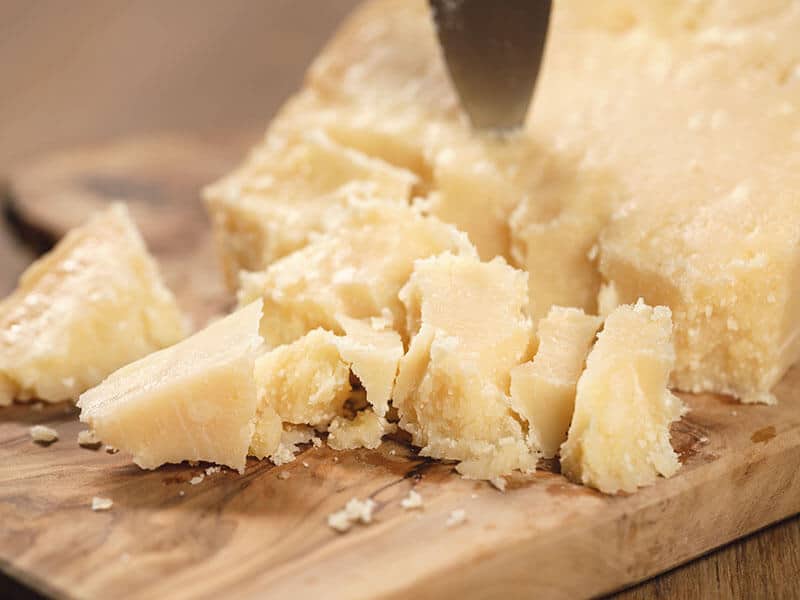
10. Mozzarella
In fact, Mozzarella is not really similar to Fontina regarding the texture and aftertaste. Mozzarella is known for its soft texture. Their flavor, at first, is nutty, sweet, and savory, but you will sense the richness, even richer than Fontina in the aftertaste.
One of the reasons for this difference is Mozzarella is mainly made from buffalo milk. You can also find sheep or cow milk Mozzarella, but these versions have crumbier textures.
So, in general, substituting Fortina with Mozzarella is acceptable in salads, sandwiches, pizza, pasta, or meaty dishes.
What cheese is good for your keto menu? Well, it must be Mozzarella.
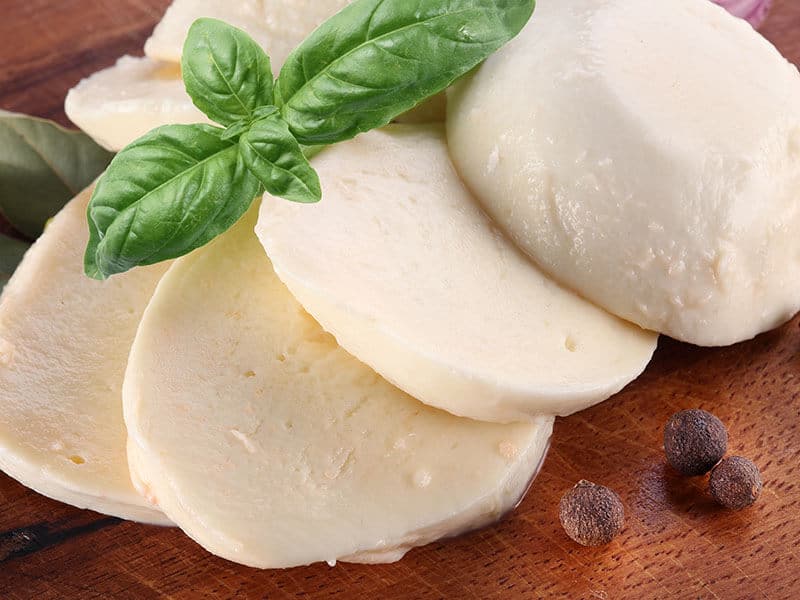
11. Montasio
If you do not mind the high-fat level cheese, Montasio can replace Fontina pretty well. These 2 kinds of cheese are both from Italy and made with cow milk, making them perfect for swapping one for another because of the replicate flavor and texture.
As Montasio’s flavor is similar to Fontina, you can basically use this substitution in any recipe that calls for Fontina cheese.
Montasio is a semi-firm mountain cheese with a light yellow color and some small holes in the interior. However, this kind of cheese might not be too easy to find in some places, similar to Fontina ones.
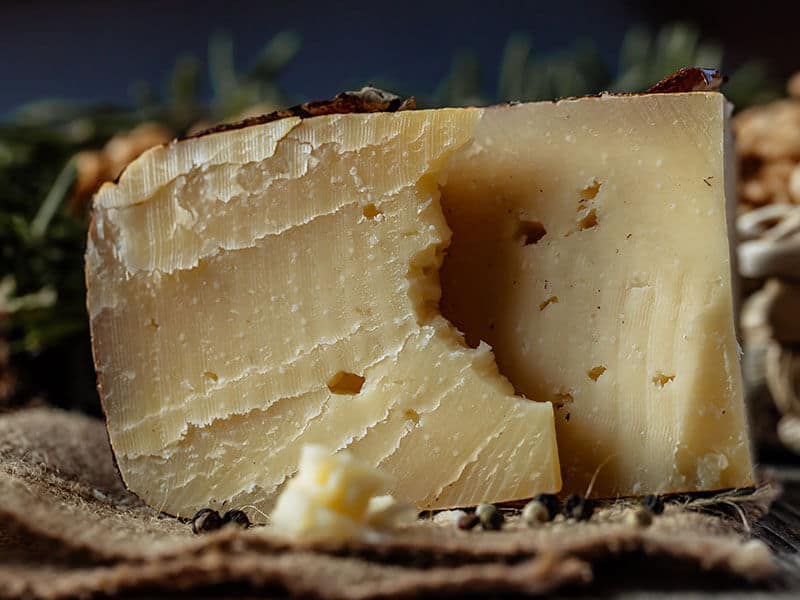
12. Bel Paese
Bel Paese cheese can also work in place of Fontina as these 2 have similar flavor and texture.
Indeed, Bel Paese has a lingering and milky smell that makes them so special to highlight your dishes, like pizzas, fillings, fondues, desserts, or any recipes that ask for the thickness. Thanks to their semi-soft texture, Bel Paese can melt easily like Fontina.
If you want to serve them as a table cheese, feel free to slice this cheese and enjoy them with fruits or wines.
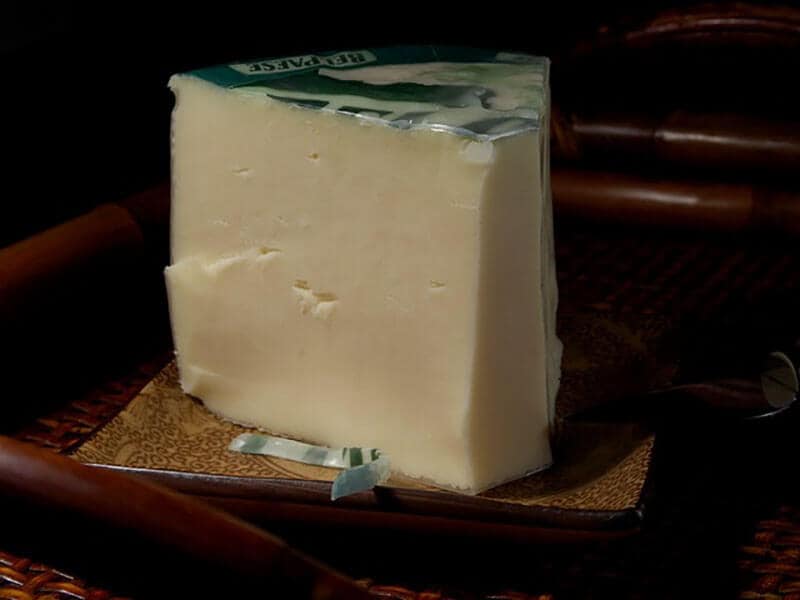
13. Appenzeller
Another Swiss cheese that you should save to the substitution list is Appenzeller. Come in smaller sizes with a semi-hard and creamy texture, this type of cheese can replace Fontina well in pasta, macaroni, and fondue.
Besides, their mild to tangy, nutty (or fruity) flavor is the reason that makes them become a good alternative for Fontina.
Appenzeller is also a holey cheese with light yellow color. When they are matured, their flavor is spicier. So make sure it is not too spicy or too aged when you exchange it for Fontina.
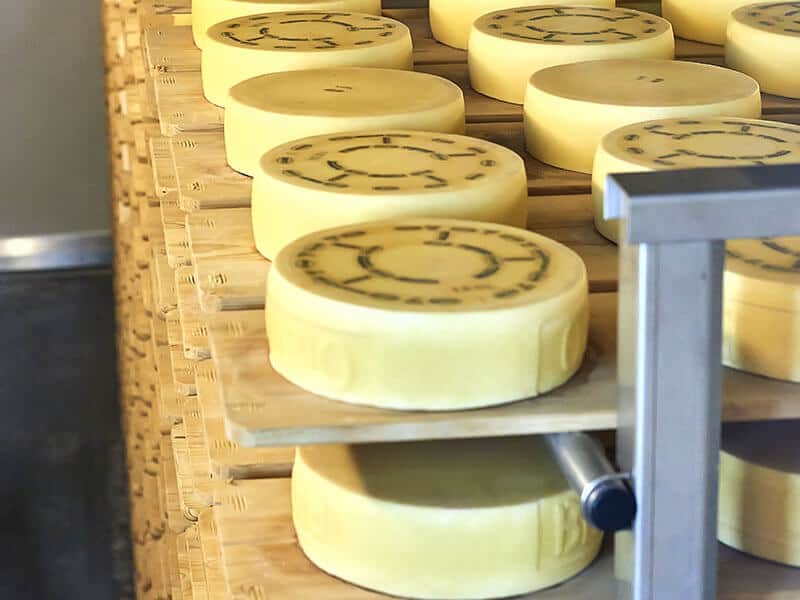
14. Parmesan
Thanks to the nutty taste with hard and thick texture, Parmesan cheese is another good solution to swap for Fontina. And the best thing about it is you can find them in the supermarket effortlessly.
This Italian cheese typically needs 2 to 3 years for fully matured cheese. Therefore, its flavor is rich and a little bitter. They are also low in sodium, so Parmesan is a healthy cheese for your menu.
Overall, this cheese can replace Fontina in many dishes, like pasta, pizza, soups, veggies, and sandwiches in grated, sliced, or shredded form. However, you should not use Parmesan cheese to make sauces.
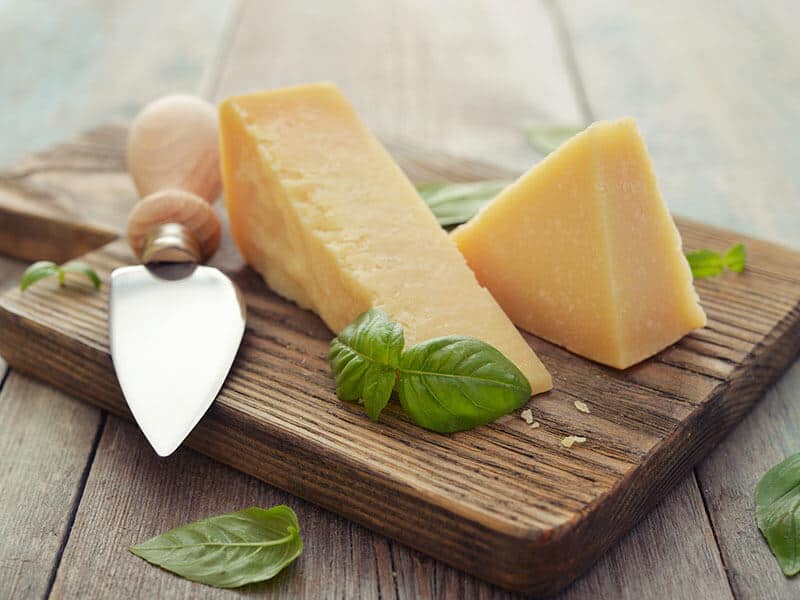
15. Cheddar
Here is another commonly used cheese that can work well as Fontina cheese substitution. It is Cheddar, a true friend in many kitchens.
Come in hard texture and salty flavor; this cheese is excellent to swap for Fontina in pizza and pasta topping, casseroles, sandwiches, pastries, salads, or dips.
In general, you can eat them uncooked or cooked. Either way is totally fine. But remember that young Cheddar’s flavor is milder than Fontina cheese, so it would be better to choose aged cheddar as it has an intense flavor.
Also, American Cheddar is not an ideal substitution. So if possible, use the authentic England variety for the closest flavor with Fontina.
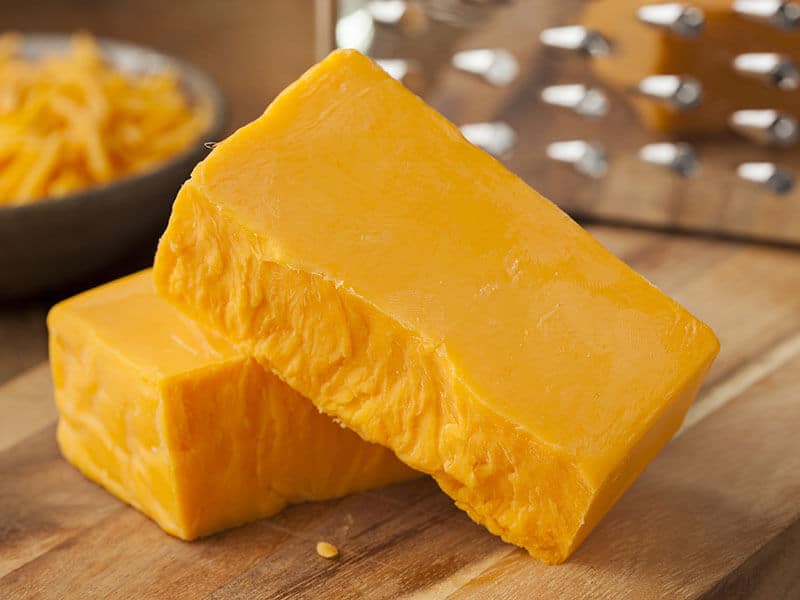
16. Tofu
Tofu – a white plant-based food source made from soy milk, is another good substitution. Tofu can be firm, super firm, soft, or super soft. But I prefer to choose the firm tofu to exchange this cheese.
Tofu can be eaten uncooked or cooked. Their original flavor is bland and sour, but they pair well with sauces, dips, pasta, or pies.
Making tofu is a simple process. So give them a try. You can see this video to know more:
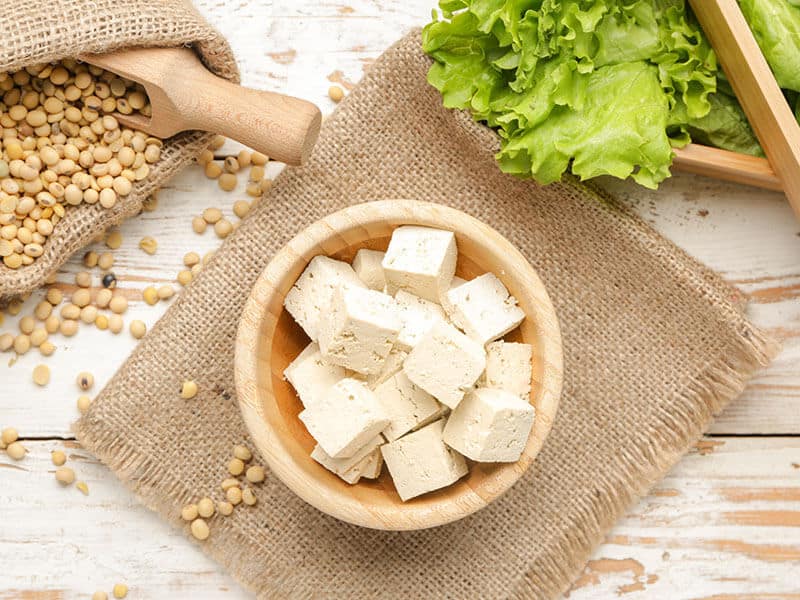
17. Nutritional Yeast
Like tofu, nutritional yeast is not only a perfect ingredient for vegan recipes but also for replacing Fontina cheese. If you are going to make baked pasta, do not hesitate to choose nutritional yeast instead of using the cheese.
Cheesy and savory are how I can describe the flavor of this ingredient, making them so perfect for swapping for mature and firm Fontina, particularly in grated form.
Plus, they contain minerals, vitamins, and other beneficial compounds, so if you want something good for your health, just go for it.
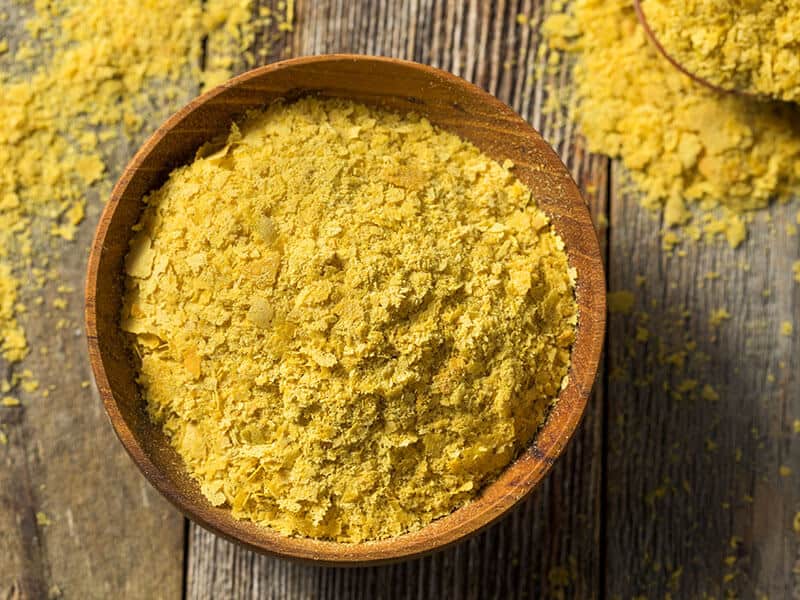
FAQs
Lastly, I believe you should check some commonly asked questions about Fontina cheese before finishing this post. Let’s take a quick look at them.
What Are Your Go-To Fontina Cheese Alternatives?
The article showed you many options for replacing Fontina cheese, from expensive to affordable ones, from non-vegan to vegan ones.
Why don’t you click save or share this post on your page so these options will be your saver whenever you cannot find this cheese? And if you like my post, your rating is appreciated. Thank you so much!
References
- En.wikipedia.org.. Fontina – Wikipedia. [Online]. Available at: <https://en.wikipedia.org/wiki/Fontina>.
- Fdc.nal.usda.gov.. Fooddata Central – Fontina Cheese. [Online]. Available at: <https://fdc.nal.usda.gov/fdc-app.html#/food-details/170843/nutrients>.
- Fdc.nal.usda.gov.. Fooddata Central – Taleggio Cheese . [Online]. Available at: <https://fdc.nal.usda.gov/fdc-app.html#/food-details/442223/nutrients>.

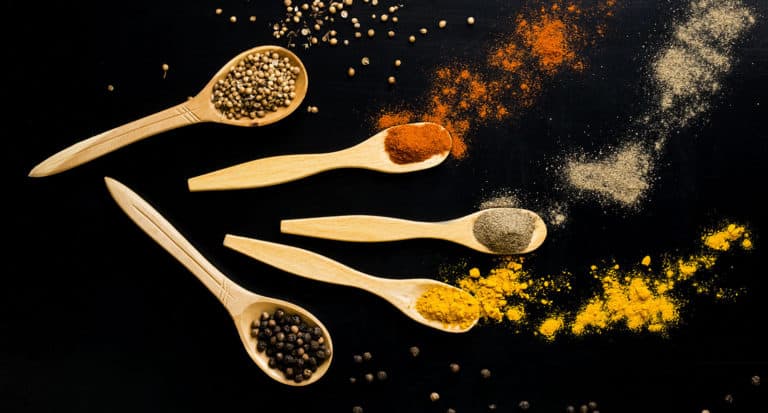
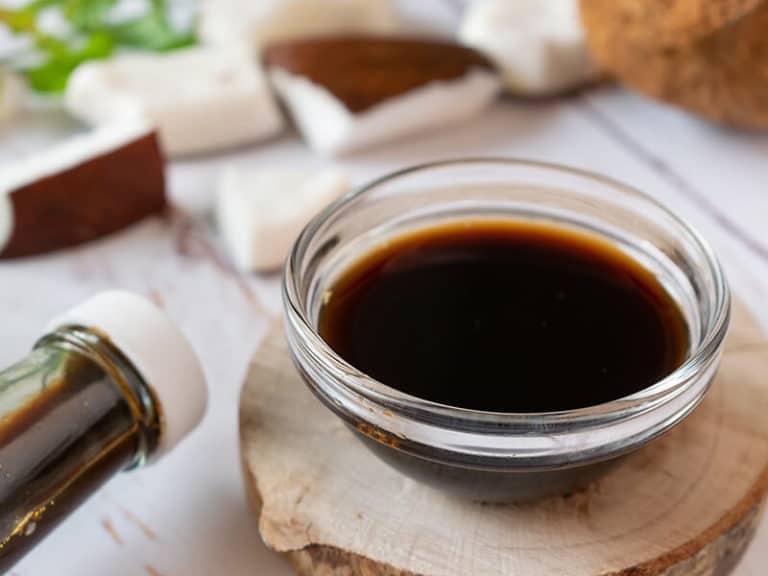
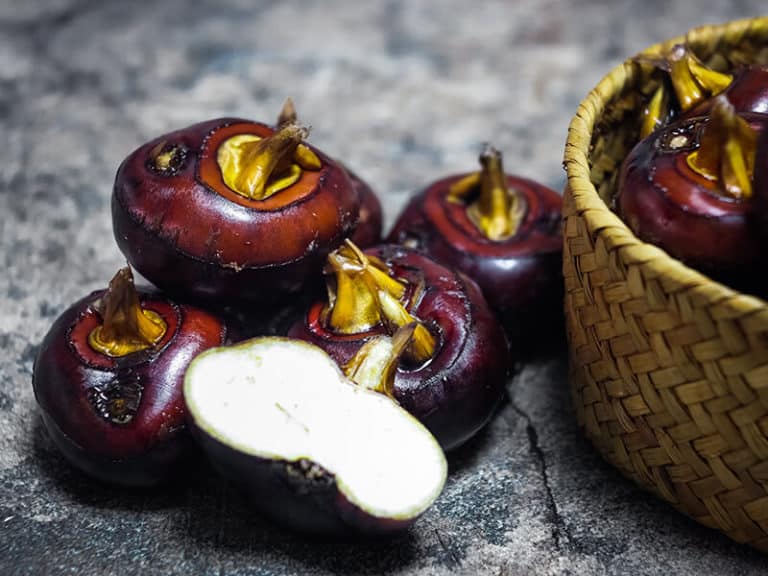
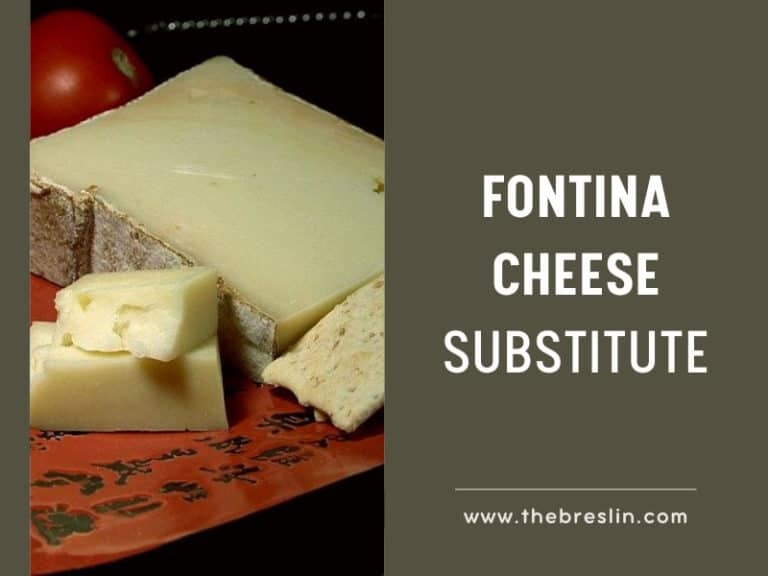


Amanda Collins
Founder and Senior Culinary Editor
Expertise
Culinary Arts and Management, Food Journalism and Critique, Recipe Development and Testing, Global Culinary Traditions, Sustainable Food Practices
Education
Institute of Culinary Education (ICE), New York, NY
Program: Diploma in Culinary Arts
Focus: Intensive hands-on training in culinary techniques, recipe development, and kitchen management, preparing students for professional roles in the culinary industry.
Monroe College, New Rochelle, NY
Program: Associate in Applied Science in Culinary Arts
Focus: Practical culinary skills, including cooking techniques, menu planning, and kitchen operations, with an emphasis on hands-on experience and industry standards.
Amanda Collins is a seasoned chef and food editor with a deep love for global flavors. Trained at the Institute of Culinary Education and Monroe College, and with over 15 years in the culinary field, Amanda has refined her skills in kitchens worldwide. Her background in food studies gives her a unique ability to share both recipes and the cultural stories that shape them.
As senior culinary editor at thebreslin.com, Amanda’s work brings authentic dishes to life, inviting readers to explore new flavors and techniques from around the globe. Her approachable style makes it easy for anyone to bring a bit of the world’s cuisine into their kitchen.